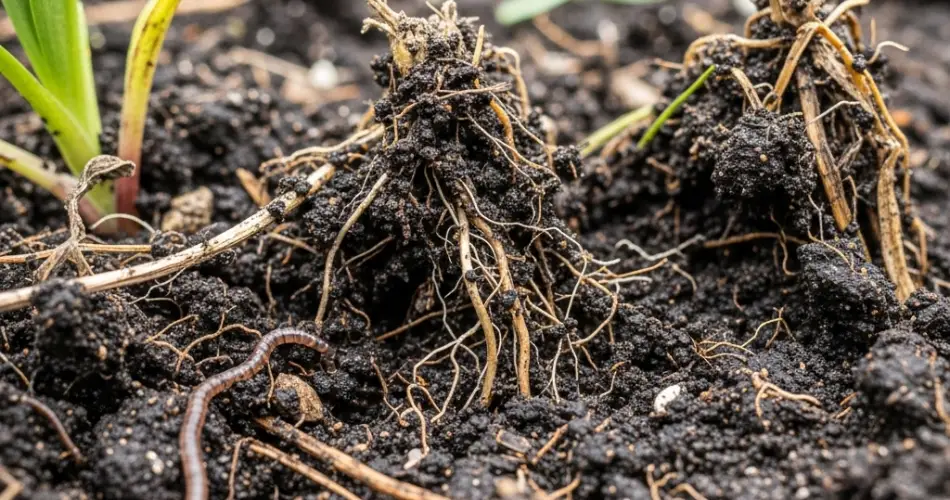Every gardener knows that healthy soil is the foundation for thriving plants. Yet, over time, potting soil or garden soil can become hard, compacted, and depleted of nutrients. This deterioration not only limits water retention and root growth but also stresses plants, leaving them vulnerable to disease and poor development.
Fortunately, there is a simple and effective secret to rejuvenate your plant soil, keeping it loose, fertile, and full of life—using a homemade organic fertilizer. This natural approach improves soil structure, feeds beneficial microbes, and boosts plant growth without the need for chemical inputs.
Why Does Soil Become Hard and Old?
Soil becomes hard and crusty primarily due to several factors:
-
Loss of organic matter: Over time, soil loses the decomposed plant and animal material that keeps it soft and fertile.
-
Compaction: Frequent watering, foot traffic, or heavy pots press soil particles tightly together, reducing air pockets.
-
Nutrient depletion: Continuous plant growth extracts essential nutrients from the soil, which are not naturally replenished.
-
Poor microbial activity: Healthy soil teems with microorganisms that break down organic material and improve texture. When this community declines, soil quality suffers.
When soil hardens, water struggles to penetrate and drain properly, roots cannot spread easily, and plants struggle to access the nutrients they need.
The Secret: Homemade Organic Fertilizer to Revive Soil
The secret lies in enriching your soil with organic matter that replenishes nutrients, improves texture, and stimulates beneficial microbial life. Unlike synthetic fertilizers, this homemade organic fertilizer feeds the soil itself, making it a living ecosystem that supports robust plants.
How to Make This Organic Fertilizer
Ingredients:
-
Vegetable scraps (carrot peels, potato skins, onion ends, etc.)
-
Eggshells (crushed)
-
Coffee grounds
-
Banana peels
-
Water
Instructions:
-
Collect vegetable scraps and fruit peels that would otherwise be discarded. Avoid using any spoiled or moldy material.
-
Dry the scraps in the sun or in a dehydrator to prevent mold buildup.
-
Once dried, blend or crush the materials into small pieces.
-
Mix the crushed scraps, coffee grounds, and crushed eggshells into a jar.
-
Add water to cover the mixture, then stir well.
-
Let the mixture sit for a few days to ferment slightly. This process releases nutrients and activates beneficial microbes.
-
Strain the liquid and dilute it with water in a ratio of 1:4 before using it to water your plants or soil.
How This Fertilizer Benefits Your Soil
-
Improves Soil Structure: The organic matter helps break up compacted soil, increasing aeration and drainage.
-
Boosts Nutrient Content: Ingredients like eggshells add calcium, coffee grounds provide nitrogen, and banana peels supply potassium and phosphorus.
-
Stimulates Microbial Life: The fermentation process encourages beneficial bacteria and fungi, essential for healthy soil ecology.
-
Enhances Water Retention: Organic matter holds moisture better, reducing the frequency of watering.
-
Safe and Chemical-Free: This fertilizer nourishes your plants naturally without harmful residues.
How to Use This Fertilizer in Your Garden or Pots
-
For potted plants: Water the soil once every two weeks with the diluted organic fertilizer to keep the soil lively and nutrient-rich.
-
For garden beds: Apply the fertilizer around the base of plants during the growing season or before planting to enhance soil fertility.
-
For seed starting: Mix a small amount of the dried organic scraps into seed starting mix for a nutrient boost.
Additional Tips to Keep Your Soil Healthy and Soft
-
Add compost regularly: Complement the fertilizer with homemade or store-bought compost to maintain a steady supply of organic matter.
-
Avoid overwatering: Water only when necessary to prevent soil compaction and root rot.
-
Use mulch: A layer of organic mulch helps retain moisture and slowly decomposes, feeding the soil.
-
Rotate crops: If you have a vegetable garden, rotate plants each season to prevent nutrient depletion.
-
Avoid synthetic chemicals: These can harm beneficial soil organisms that keep your soil healthy.
Signs of Healthy Soil and Thriving Plants
When you use this homemade organic fertilizer regularly, your soil will feel crumbly and light rather than hard and crusty. Your plants will show:
-
Deep green leaves
-
Strong, well-developed roots
-
Increased flowering and fruit production
-
Improved resistance to pests and diseases
Final Thoughts
Soil is much more than just dirt—it’s a living, breathing system that nurtures your plants. By feeding your soil with natural organic matter and encouraging a vibrant microbial community, you create the ideal environment for your plants to thrive.
This simple homemade organic fertilizer is a game-changer for anyone who wants to keep their plant soil from becoming hard and old. It’s easy to make, sustainable, and incredibly effective.
Try incorporating this secret into your gardening routine, and enjoy the benefits of soft, fertile soil and flourishing plants all year round.



